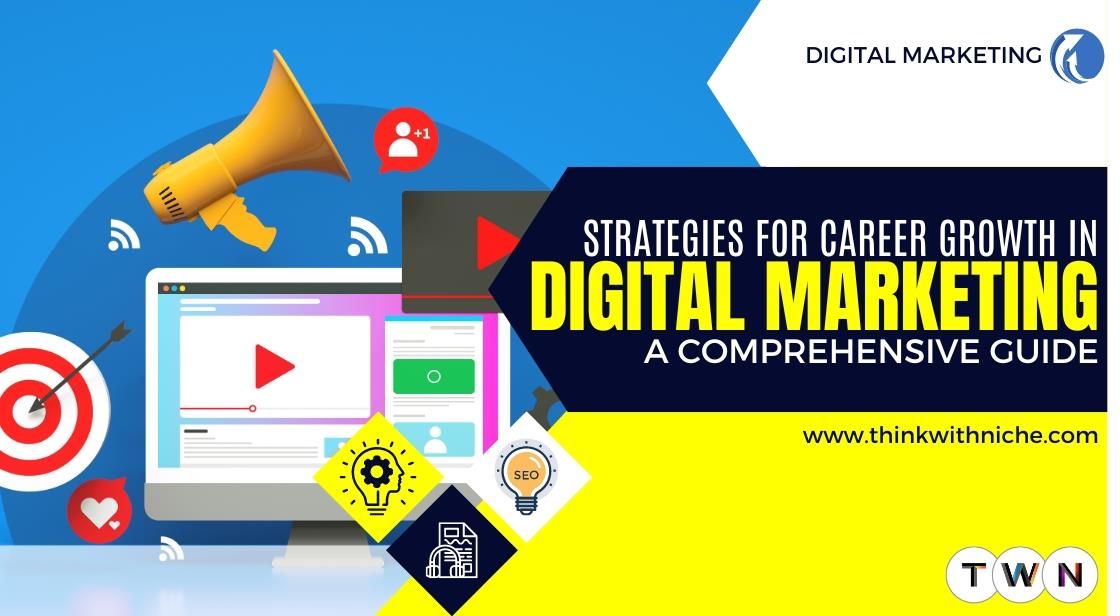Strategies for Career Growth in Digital Marketing: A Comprehensive Guide

Blog Post
In today's digital age, the field of marketing has undergone a profound transformation, with digital marketing emerging as a vital component for businesses to reach and engage with their target audiences. As a result, the demand for skilled digital marketers continues to rise, presenting abundant opportunities for career growth and advancement.
However, in a rapidly evolving landscape, staying ahead requires more than just basic skills. It demands a comprehensive understanding of industry trends, innovative strategies, and continuous learning.
This comprehensive guide aims to provide aspiring and seasoned digital marketers alike with actionable strategies for advancing their careers in this dynamic field. Whether you're just starting out or looking to take your career to the next level, this guide will equip you with the tools, knowledge, and insights needed to succeed in the competitive world of digital marketing.
From honing essential skills such as search engine optimization (SEO), content marketing, and social media management to mastering advanced tactics like data analytics, conversion rate optimization (CRO), and marketing automation, each chapter will delve into key areas essential for career growth.
Additionally, we'll explore the importance of building a personal brand, networking effectively, and staying updated with industry developments.
Furthermore, we'll discuss strategies for professional development, including obtaining certifications, attending industry events, and seeking mentorship opportunities.
By implementing these strategies and staying adaptable in an ever-changing landscape, digital marketers can position themselves for long-term success and unlock new opportunities for career advancement.
How to Progress Your Digital Marketing Career?
1. Assess Your Skills and Identify Areas for Improvement:
Assessing Your Skills:
Before you begin your journey to advance your digital marketing career, it's essential to conduct a thorough assessment of your current skillset. This involves evaluating your proficiency in key areas critical to digital marketing success.
Identification of Key Areas:
Search Engine Optimization (SEO):
-
Evaluate your understanding of SEO principles, including keyword research, on-page optimization, off-page optimization, and technical SEO.
-
Assess your ability to optimize website content for search engines and improve search engine rankings.
Content Marketing:
-
Review your skills in creating high-quality, engaging content across various formats, such as blog posts, articles, videos, infographics, and podcasts.
-
Consider your knowledge of content strategy, audience targeting, content promotion, and measuring content performance.
Social Media Management:
-
Assess your proficiency in managing social media accounts across platforms like Facebook, Twitter, Instagram, LinkedIn, and Pinterest.
-
Evaluate your ability to develop social media strategies, create compelling content, engage with followers, and analyze social media metrics.
Email Marketing:
-
Review your skills in creating effective email marketing campaigns, including writing engaging email copy, designing visually appealing templates, and segmenting email lists.
-
Assess your knowledge of email automation, A/B testing, email deliverability, and email performance tracking.
Analytics:
-
Evaluate your ability to analyze data and derive insights from digital marketing campaigns using tools like Google Analytics, Adobe Analytics, or Facebook Insights.
-
Consider your skills in setting up tracking, interpreting metrics, identifying trends, and making data-driven decisions to optimize marketing strategies.
Seeking Feedback and Self-Assessment:
Once you've identified the key areas of digital marketing, seek feedback from peers, mentors, or industry professionals to gain insights into your strengths and weaknesses. Additionally, conduct a self-assessment by reflecting on your past experiences, projects, and achievements in each area.
Identify areas where you excel and areas where you need improvement, and use this information to create a personalized development plan for advancing your digital marketing career.
2. Set Clear Goals and Define Your Career Path:
Setting Clear Goals:
Setting clear, actionable goals is essential for guiding your career path in digital marketing. Start by considering your long-term aspirations and breaking them down into smaller, achievable objectives. These goals should be specific, measurable, achievable, relevant, and time-bound (SMART).
Defining Your Career Path:
Once you've established your goals, it's important to define your career path within the digital marketing industry. This involves identifying the specific roles or areas of specialization you're interested in pursuing. Whether you aspire to become a digital marketing manager, SEO specialist, content marketer, social media strategist, or email marketing expert, clarifying your career path will help you focus your efforts and make informed decisions about your professional development.
Considering Future Growth:
When defining your career path, it's also crucial to consider future growth opportunities within the digital marketing field. Take into account emerging trends, technologies, and industry developments that may impact the demand for certain skills or roles. Additionally, consider how your chosen career path aligns with your long-term career goals and aspirations.
Identifying Necessary Steps:
Once you've identified your desired career path, determine the necessary steps you need to take to reach your goals. This may include acquiring specific skills or certifications, gaining relevant experience through internships or freelance projects, building a strong professional network, and continuously learning and staying updated with industry trends.
Adapting as Needed:
While it's important to set clear goals and define your career path, it's also essential to remain flexible and adaptable to change. The digital marketing industry is constantly evolving, and new opportunities may arise that require you to adjust your plans accordingly. Stay open to exploring new paths and seizing opportunities for growth and advancement as they arise.
Also Read: 10 Trending Business Ideas for Indian Entrepreneurs in 2024
3. Investing in Continuous Learning and Skill Development in Digital Marketing
Continuous learning is imperative for professionals in the rapidly evolving field of digital marketing. By staying updated with the latest trends, tools, and techniques, individuals can enhance their skills and remain competitive in the industry.
Here's how you can invest in continuous learning and skill development:
Explore Online Courses and Workshops:
Online platforms such as Coursera, Udemy, and HubSpot Academy offer a plethora of courses and workshops covering various aspects of digital marketing. These platforms provide flexible learning options, allowing professionals to access high-quality content at their own pace.
From beginner to advanced levels, individuals can find courses tailored to their specific needs and interests.
Attend Webinars and Industry Conferences:
Webinars and industry conferences are excellent opportunities to stay updated with the latest trends and best practices in digital marketing. These events feature expert speakers, panel discussions, and networking opportunities, providing valuable insights and knowledge sharing.
By attending webinars and conferences, professionals can gain new perspectives, learn about emerging technologies, and connect with peers and industry leaders.
Pursue Industry-Recognized Certifications:
Industry-recognized certifications such as Google Analytics, Facebook Blueprint, and HubSpot Inbound Marketing are valuable credentials that demonstrate expertise in specific areas of digital marketing.
These certifications not only enhance your credentials but also validate your knowledge and skills to potential employers or clients. By pursuing certifications, professionals can differentiate themselves in the competitive job market and increase their career prospects.
Engage in Hands-On Projects and Case Studies:
Practical experience is essential for mastering digital marketing skills. Engaging in hands-on projects and case studies allows professionals to apply theoretical knowledge to real-world scenarios, gaining valuable insights and practical expertise.
Whether it's optimizing a website for search engines, creating a social media campaign, or analyzing data analytics, hands-on projects provide valuable learning opportunities and help professionals develop their skills.
4. Gain Practical Experience Through Hands-On Projects
In the dynamic field of digital marketing, practical experience is essential for honing skills and demonstrating expertise to potential employers or clients. Here's how you can gain valuable hands-on experience through real-world projects:
Seek Opportunities:
Look for opportunities to work on real-world projects, which can be obtained through various avenues such as internships, freelance gigs, or personal projects. Internships with digital marketing agencies or companies provide structured learning experiences and exposure to diverse projects.
Freelance gigs allow you to work independently on projects for clients, gaining valuable experience while building your portfolio. Personal projects provide the flexibility to explore areas of interest and experiment with different strategies without the pressure of client expectations.
Diversify Your Projects:
Diversify your hands-on projects to gain experience across different areas of digital marketing. This could include creating and executing a social media campaign to increase brand awareness and engagement, optimizing a website for search engines to improve organic visibility and traffic, or running paid advertising campaigns on platforms like Google Ads or Facebook Ads to drive targeted traffic and conversions.
By working on a variety of projects, you'll develop a well-rounded skill set and showcase your versatility to potential employers or clients.
Apply Theoretical Knowledge:
Hands-on projects provide the opportunity to apply theoretical knowledge gained through courses, workshops, or self-study. By implementing digital marketing strategies in real-world scenarios, you'll deepen your understanding of concepts and learn how to overcome practical challenges.
For example, you may experiment with different content formats and posting schedules to optimize social media performance or conduct A/B tests to improve email marketing conversion rates. Through hands-on experience, you'll refine your skills and develop problem-solving abilities essential for success in digital marketing.
Build a Strong Portfolio:
As you complete hands-on projects, document your work and showcase the results in a professional portfolio. Include details such as project objectives, strategies employed, tactics implemented, and outcomes achieved.
Use visual elements such as screenshots, graphics, or videos to enhance the presentation of your work. A strong portfolio demonstrates your capabilities, achievements, and creativity to potential employers or clients, increasing your credibility and chances of securing opportunities in the competitive digital marketing industry.
5. Building a Strong Online Presence and Personal Brand
In the digital marketing industry, establishing a robust online presence and cultivating a strong personal brand are essential for career advancement and professional success.
Create a Professional Website or Blog
Building a professional website or blog is a foundational step in establishing your online presence and personal brand. Your website serves as a centralized platform to showcase your work, expertise, and insights in the field of digital marketing.
Ensure that your website is visually appealing, easy to navigate, and contains relevant information about your background, skills, and accomplishments.
Publish High-Quality Content Regularly
Consistently publishing high-quality content demonstrates your expertise and thought leadership in the digital marketing industry. Create valuable and engaging content that addresses the pain points and challenges faced by your target audience.
This could include blog posts, articles, case studies, whitepapers, or video tutorials. By sharing valuable insights and actionable advice, you position yourself as a trusted authority in your field.
Participate in Online Communities and Industry Forums
Engaging with online communities and industry forums is a great way to connect with peers, share knowledge, and stay updated with the latest trends and developments in digital marketing. Join relevant groups on platforms like LinkedIn, Facebook, and Reddit, and actively participate in discussions. Share your expertise, offer advice, and contribute to the community to establish yourself as a valuable member.
Engage with Peers and Influencers on Social Media
Social media platforms like LinkedIn, Twitter, and Instagram are powerful tools for building your personal brand and expanding your network. Engage with peers, industry influencers, and thought leaders by sharing relevant content, commenting on their posts, and participating in conversations.
Establishing meaningful connections with influential figures in the digital marketing industry can open doors to networking opportunities, collaborations, and career advancements.
6. Network Effectively and Seek Mentorship:
Networking for Career Advancement:
Networking serves as a crucial catalyst for career growth in digital marketing. By actively engaging in networking activities, professionals can expand their circle of contacts, gain valuable insights, and uncover new opportunities within the industry.
Attend Industry Events and Conferences:
Attending industry events, conferences, and meetups offers a prime opportunity to connect with like-minded professionals, thought leaders, and potential employers or clients. These gatherings provide a platform for exchanging ideas, sharing experiences, and building relationships that can lead to collaboration or career advancement opportunities.
Join Professional Associations and Online Communities:
Joining professional associations and online communities related to digital marketing provides a valuable networking resource. These platforms offer forums for discussion, knowledge sharing, and collaboration among industry peers.
By actively participating in these communities, professionals can expand their network, stay updated with industry trends, and establish themselves as thought leaders within the field.
Seeking Mentorship:
Mentorship plays a crucial role in professional development and career advancement. Seeking guidance from experienced professionals allows individuals to benefit from their expertise, insights, and perspectives. Mentors can provide valuable advice, share their experiences, and offer support as mentees navigate their career path in digital marketing.
Benefits of Mentorship:
Mentorship offers numerous benefits, including access to valuable industry insights, career guidance, and personal development opportunities. Mentors can provide feedback, offer constructive criticism, and help mentees overcome challenges they may encounter in their career journey.
Additionally, mentorship relationships often lead to long-term professional connections and friendships that can support career growth and success.
7. Stay Updated with Industry Trends and Innovations:
In the ever-changing landscape of digital marketing, staying abreast of the latest industry trends, technologies, and innovations is paramount for professionals seeking to maintain their competitive edge and drive results. Here's how you can effectively stay updated:
Follow Industry Blogs and Websites:
Regularly perusing reputable industry blogs and websites is an excellent way to stay informed about the latest developments in digital marketing. Sites like Moz, Search Engine Journal, and Social Media Examiner offer valuable insights, expert analysis, and practical tips on a wide range of topics, including SEO, content marketing, social media, and more.
Subscribe to Newsletters:
Subscribing to newsletters from leading digital marketing publications and thought leaders can provide you with a curated selection of top stories, trends, and insights delivered straight to your inbox. Look for newsletters from platforms like HubSpot, Neil Patel, and MarketingProfs, which offer a wealth of valuable content tailored to digital marketers.
Listen to Podcasts:
Podcasts have become increasingly popular among digital marketing professionals as a convenient way to consume industry insights on the go. Tune in to podcasts hosted by industry experts and practitioners to stay updated on the latest trends, strategies, and case studies. Popular digital marketing podcasts include Marketing School, The Digital Marketing Podcast, and Social Media Marketing Talk Show.
Experiment with New Tools and Techniques:
To stay ahead of the curve, it's essential to be proactive in experimenting with new tools and techniques that emerge in the digital marketing landscape. Whether it's testing out a new social media scheduling tool, exploring the capabilities of a cutting-edge analytics platform, or experimenting with emerging trends like voice search optimization or interactive content, embracing innovation is key to staying relevant in the field.
Be Open to Innovation:
Digital marketing is a dynamic and rapidly evolving field, and being open to adopting innovative strategies is crucial for success. Keep an eye on emerging trends and technologies, and be willing to adapt your approach to leverage new opportunities as they arise.
By staying flexible and embracing innovation, you can position yourself as a forward-thinking digital marketer capable of driving impactful results for your clients or organization.
8. Adapt to Changes and Embrace Challenges:
Adapting to Changes:
In the ever-evolving landscape of digital marketing, it's crucial to remain adaptable to changes in technology, consumer behavior, and industry trends. Stay informed about emerging technologies, platforms, and tools that can enhance your marketing strategies.
Be open to experimenting with new approaches and techniques, and be willing to pivot your strategies based on evolving market dynamics. By staying adaptable, you can ensure that your skills and tactics remain relevant in an ever-changing digital environment.
Embracing New Challenges:
Challenges are inevitable in any career, but they also present opportunities for growth and development. Instead of shying away from challenges, embrace them as opportunities to expand your skill set and knowledge base.
Seek out projects or tasks that push you out of your comfort zone and challenge you to learn new things. Embracing challenges with a positive attitude can help you build resilience and confidence in your abilities as a digital marketer.
Proactive Growth and Learning:
To stay ahead in the field of digital marketing, it's essential to be proactive in seeking opportunities for growth and learning. Take the initiative to expand your knowledge through courses, workshops, and certifications. Stay updated with industry news and trends by following relevant blogs, attending conferences, and participating in online forums. By taking a proactive approach to learning, you can continuously improve your skills and stay competitive in the job market.
Learning from Failures:
Failures are inevitable in any career, but they can also serve as valuable learning experiences. Instead of dwelling on your mistakes, use them as opportunities to reflect, learn, and grow. Analyze what went wrong, identify areas for improvement, and use this knowledge to inform your future decisions and actions. By adopting a growth mindset and embracing failures as part of the learning process, you can turn setbacks into stepping stones for success.
Flexibility and Agility:
In the fast-paced world of digital marketing, flexibility and agility are essential qualities for success. Be willing to adapt your strategies and tactics in response to changing market conditions, consumer preferences, and technological advancements.
Stay nimble in your approach, and be prepared to pivot or change direction as needed to achieve your goals. By remaining flexible and agile, you can navigate the challenges and opportunities of the digital marketing landscape with confidence and ease.
Conclusion:
Advancing your digital marketing career requires a combination of strategic planning, continuous learning, practical experience, and networking. By assessing your skills, setting clear goals, investing in continuous learning, gaining practical experience, building a strong online presence, networking effectively, staying updated with industry trends, and adapting to changes, you can position yourself for long-term success and achieve your career aspirations in the dynamic field of digital marketing.
You May Like
EDITOR’S CHOICE












